| “ | Right, right. Myth and science were both true - simply different versions of the same reality, blah blah. I'd heard that lecture a hundred times, and I didn't want to hear it again. | ” |
–Sadie Kane, in The Throne of Fire. | ||
| “ | How could it not be possible. In ancient times, this was common sense. Each country, sometimes each city, had its own pantheon of gods. We Olympians have always been used to living in close proximity to, ah...the competition. | ” |
–Apollo explaining to Thalia how different gods exist in The Dark Prophecy. | ||
Mythology is a collection of myths, especially one belonging to a particular religious or cultural tradition of a group of people – their collection of stories they tell to explain nature, history, and customs – or the study of such myths.[1]
Percy Jackson and the Olympians, The Kane Chronicles, The Heroes of Olympus, Magnus Chase and the Gods of Asgard, and The Trials of Apollo all center on the presence of various mythological concepts in the modern world and the forces put in place to combat them. A recurrent theme is the emergence of a malevolent figure from mythology seeking to destroy the world, only to be defeated by modern-day heroes with the aid of their gods.
The following mythologies have appeared in Rick Riordan's works with starring roles in various series. As well as playing a role in most of the books published under the Rick Riordan Presents imprint.
Greek mythology[]
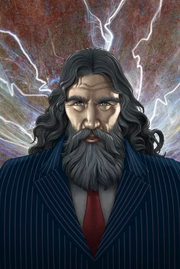
Zeus, the supreme god in Greek mythology
Greek mythology is the collection of myths belonging to the ancient Greeks, especially based on accounts written by well-known poets or philosophers such as Homer, Hesiod, and Plato. It revolves mostly around stories concerning the Ancient Greek pantheon and the mortal heroes such as Odysseus and Achilles.
It is prominently featured in Percy Jackson and the Olympians and The Heroes of Olympus, focusing largely on the Second Titan War and Second Giant War fought by the demigods of Camp Half-Blood and Camp Jupiter.
The Greek gods are strongly tied to a metaphysical force known as Western Civilization, residing wherever the "flame" is brightest. The current epi-center of Western Civilization is the United States of America, specifically New York City.
Egyptian mythology[]
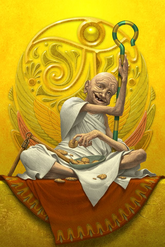
Ra, the supreme god in Egyptian mythology
Egyptian mythology is the collection of myths from Ancient Egypt. It is prominently featured in The Kane Chronicles trilogy, focusing largely on the War Against Apophis and his forces of chaos by the magicians of the House of Life. Many of the Egyptian gods were banished to the Duat when Egypt became a part of the Roman Empire.
Thousands of years later, they were released by Julius Kane into the modern world. Unlike most pantheons shown, they do not have offspring with mortals, rather then have a form of symbiotic relationship with magicians who share a magical affiliation with their attributes and, in rare cases, demigods from other pantheons.
Roman mythology[]
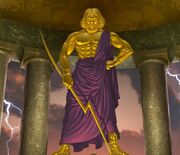
Jupiter, the supreme god in Roman mythology
Roman mythology is the collection of myths belonging to the ancient Romans, especially based on the accounts of esteemed Roman poets such as Ovid and Virgil, whose greatest works include The Metamorphoses, a poem describing changed forms and bodies, and the birth and growth of the world, and The Aeneid, a poem describing the travels of Aeneas after the fall of Troy, and his subsequent founding of Rome.
It is prominently featured in The Heroes of Olympus series. When the flame of Western Civilization shifted from Greece to Rome, many of the Greek myths were reinterpreted under Roman names, thus causing the gods to develop alternate forms and forming the basis of Roman mythology.
Norse mythology[]
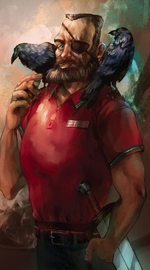
Odin, the supreme god in Norse mythology
Norse mythology is the collection of myths belonging to the Germanic and Norwegian people. It is prominently featured in Magnus Chase and the Gods of Asgard, focusing largely on the Einherji of Hotel Valhalla preparing for Ragnarök.
The Norse deities are divided into three aspects, the aesir, gods of war and power, the vanir, gods of peace and magic, and the Jotunn, a race of semi immortal giants. All three are capable of siring demigod children with humans, dwarves, and elves.
The Nine Worlds of the Norse myths are each home to a different group of beings. Asgard is home to the Aesir gods, Midgard is home to humans, Vanaheim is home to the vanir gods, Muspellheim is home to the fire Jotunns, Niflheim is the land of cold, Helheim is home to the dishonorable dead, Alfheim is home to the elves, Nidavellir is home to the dwarves, and Jotunheim is home to the Jotunns.
Hindu Mythology[]

|
Not part of Riordanverse
The following article/section is from the Pandava Quintet continuity under Rick Riordan Presents and not the Riordanverse canon. |
Hindu mythology is the collection of myths belonging to the Hindu people of India. It is prominently featured in the first Rick Riordan Presents book series, the Pandava Quintet, focusing on Pandava Demigods on quests to prevent the end of the world.
In Percy Jackson's Greek Gods, the titular character mentions the Indians had their own magic and gods to fight off Dionysus' forces. It is unclear if this is the same as the mythology featured in the Pandava Quintet books.
Apollo in The Dark Prophecy mentions the Vedic storm god, Indra, being with Apollo on a late-night road trip in search of vindaloo.
According to Roshani Chokshi, the Pandava Quintet are about what she understands from her research and book reading. The Hindu myths and legends vary from state to state, but the wonderful thing about mythology is that its arms are wide enough to embrace many traditions from many regions.[2]
Mayan Mythology[]

|
Not part of Riordanverse
The following article/section is from the Storm Runner/Shadow Bruja continuity under Rick Riordan Presents and not the Riordanverse canon. |
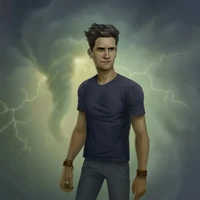
Hurakan, one of the two Mayan creator deities along with K'ukumatz
Mayan mythology is the collection of myths belonging to the people of the Yucatan Peninsula in modern day Central America. It is prominently featured in the Storm Runner Trilogy, focusing on the son of Hurakan preventing the gods from going to war.
According to Jennifer Cervantes, The Storm Runner is a snapshot of how she understands the myths and terms and what she learned from her research. Representing the many Maya mythologies, cultures, languages, pronunciations, and geographies would take an entire library.[3]
Mexica Mythology []
Mexica Mythology is the collection of myths that belonged to the Mexica people, known more widely as the Aztec Gods.
Apollo mentions Tonatiuh, the Mexica god of the Sun, being able to bring up the Sun on human sacrifices. The Mexica Gods are a focus of the sequels to The Storm Runner and the sequel series, the Shadow Bruja Duology.
Korean Mythology[]
| Not Part of Riordanverse
The following article/section is from the Thousand Worlds continuity under Rick Riordan Presents and not the Riordanverse canon. |
Korean mythology is the collection of myths belonging to the people of the Korean Peninsula. It is prominently featured in the book Dragon Pearl. Unlike the above mythologies, Korean Mythology is mostly focused on spirits of animals or creatures such as foxes, tigers, dragons, goblins, and human ghosts, and does not focus on gods.
An alternate take on the mythology is focused in The Gifted Clans series, which will feature more distinctly godly beings and focuses on magic.
Cuban Mythology[]
Cuban Mythology is the collection of myths belonging to the people on the island of Cuba. it is prominently featured in the book Sal & Gabi Break the Universe, and primarily takes the focus on the use of magic.
The Outlaw Saints is an alternate take on the mythology focused primarily on the Santeria sect of Cuban mythologies originating from African religions.
African and African-American Mythology[]
African Mythology are various mythologies belonging to African tribes and civilizations. They are not a single mythology, even if they are often lumped together. A mixture of these stories adapted to the New World are the shared stories and tales of African-Americans and are part of a larger African American mythology.
The first African mythology referenced are the Yoruba from Nigeria, whose gods are known to have Demigod children. One such Demigod, Olujime, appeared in The Dark Prophecy.

|
Not part of Riordanverse
The following article/section is from the Tristan Strong continuity under Rick Riordan Presents and not the Riordanverse canon. |
African and African-American mythology is prominently featured in the Tristan Strong Trilogy of books, which features Anansi, a West African folklore character originating from the Akan people, along with the African-American folk heroes John Henry and Brer Rabbit.
Ghanian mythology, particularly the vampire lore of the region (the Adze) is prominently featured in Serwa Boateng duology of books.
[]

|
Not part of Riordanverse
The following article/section is from the Race to the Sun continuity under Rick Riordan Presents and not the Riordanverse canon. |

Navajo Mythology is the collection of myths belonging to the people of the Navajo, or Diné, tribe. It is prominently featured in the book Race to the Sun. The gods within the Navajo pantheon are referred to as holy people rather then gods and goddesses.
Figures in the main characters encounter throughout the book include the holy people Spider Woman and Jóhonaa'éí, and spaheshifting vulture like creatures known as Bináá' yee aghání.
Mexican Mythology[]

|
Not part of Riordanverse
The following article/section is from the Paola Santiago continuity under Rick Riordan Presents and not the Riordanverse canon. |
Mexican Mythology is the collection of myths belonging to the people in Mexico that developed in the aftermath of the Spanish arrival and is distinct from Aztec and Mayan mythology. it is prominently featured in the book Paola Santiago and the River of Tears and features the titular Paola Santiago seeing out La Llorona to prove she had something to do with her friends disappearance.
Mesopotamian Mythology[]

|
Not part of Riordanverse
The following article/section is from the Sikander Aziz series continuity under Rick Riordan Presents and not the Riordanverse canon. |
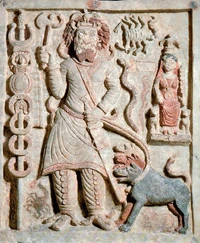
Nergal, god of disease.
Mesopotamian Mythology is the collection of myths belonging to the people of Mesopotamia, the region between the Tigris and Euphrates rivers, including Babylonian, Sumerian, and other ancient cultures.
The Babylonian god, Marduk, was referenced by Apollo in The Burning Maze.
City of the Plague God, a Rick Riordan presents novel, will focus on the region's mythology, including the mythological hero Gilgamesh.
Trivia[]
- Rick Riordan has mentioned in a interview that he is finished with Greek Mythology and Roman Mythology because he cannot find any antagonists, opposing forces, or entities from or in Greek Mythology and Roman Mythology for his books.[4]
- Percy Jackson's Greek Gods and Percy Jackson's Greek Heroes are retellings of several Greek myths.
- Aside from the above myths that have gotten a series focused on them, several other mythologies have been hinted or confirmed to exist in the main series and Rick Riordan Presents:
- God is mentioned by Chiron in The Lightning Thief and Leo Valdez in The House of Hades.
- Thor mentions wanting to fight Jesus Christ in The Sword of Summer.
- Moses is the only foreign magician to have defeated the House of Life in a duel.
- Throughout The Heroes of Olympus, Piper McLean recounts Cherokee myths. Similarly, Frank Zhang and his grandmother believe in Chinese myths and gods.
- Apollo mentions a Chinese celestial dragon in The Dark Prophecy.
- Mallory mentions Irish Celtic myths in The Ship of the Dead, while Dagda is referenced in Aru Shah and the End of Time. Lugus and the Celtic Gods are referenced by Apollo in The Tower of Nero.
- Mithras and the Leontocephaline are Roman-Persian deities with origins from Persian mythology.
- Apollo in the Burning Maze referenced Mefitis, a god of the Samnite People of south central Italy.
- A Thai Goddess of the Household, Nang Kwak, is mentioned in The Tyrant's Tomb.
- Avalon, an island crucial to the Arthurian Mythos, was mentioned in Aru Shah and the Song of Death as a destination.
- It was mentioned in Percy Jackson's Greek Gods that every mythology had some story about a flood similar to the story of Noah's ark in the Book of Genesis.[5]
- In Greek Mythology, Zeus was the one who sent the flood and the two survivors, Deucalion and Pyrrha, who were warned by Prometheus, hid in a chest to survive. This is actually just one myth of three, the other two involved Ogyges and Dardanus.
- In Egyptian Mythology, when Ra sent Sekhmet to destroy humanity for not worshipping him, it caused a flood of blood.
- In Norse Mythology, a flood of blood from Ymir appeared after he was killed by Odin and his brothers and it eventually became Earth's ocean. The flood drowned most of the Jötunn, but one named Bergelmir and his wife managed to escape on a lúðr and found a new race of ice giants in the mountains.
- In Hindu mythology, Matsya, the first incarnation of Vishnu, warned a man named Manu about an upcoming flood.
- In Maya Mythology, Hurakan and K'ukumatz sent a flood to destroy the mud people they created due to them being weak and useless.
- In Mesopotamian Mythology, Enlil, the god of wind, earth, and storms brings the flood but Enki warns Atrahasis to take apart his house and build a boat. Atrahasis stayed with his family and animals for a week.
